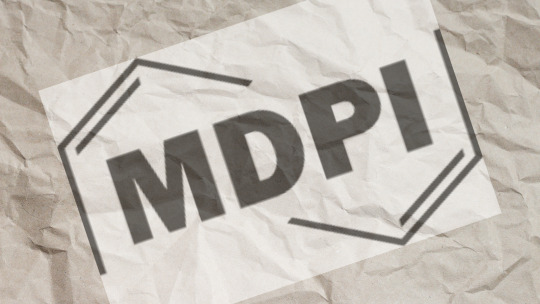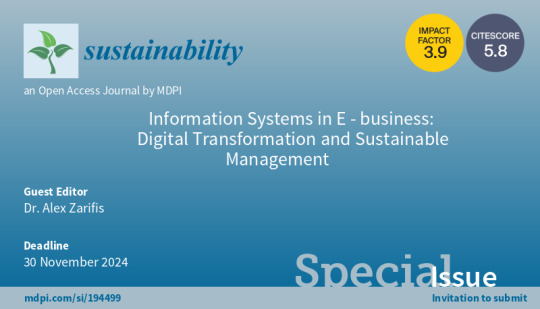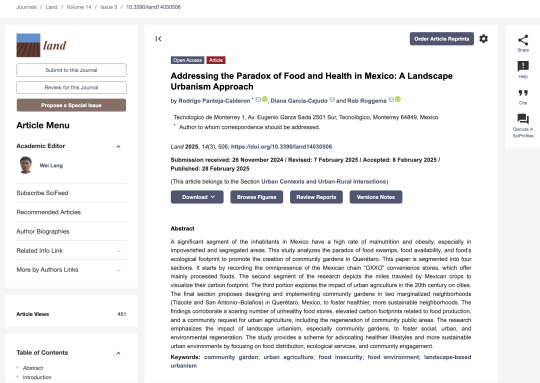#mdpi
Explore tagged Tumblr posts
Text
Calidad vs. Cantidad: el dilema de las publicaciones científicas en Chile y la influencia de MDPI
Buceando en SCOPUS me encontré con un estudio sobre la influencia de MDPI, un mega-editor de revistas científicas, en la producción científica de Chile. Es mucha la gente que ha publicado en estas plataformas que, aunque son conocidas por su rapidez y accesibilidad, han generado debate sobre la calidad de las investigaciones que allí se publican. En este artículo, los autores Francisco E. Fontúrbel y Juan L. Celis-Diez plantean un interrogante crítico ¿estamos sacrificando la calidad en la altar de la cantidad? La creciente proporción de publicaciones en revistas MDPI en Chile ha llevado a universidades y financistas a reconsiderar cómo se deben utilizar los recursos públicos en investigación.

La metodología de este estudio fue bastante pragmática. Los investigadores examinaron la base de datos Web of Science y analizaron todas las publicaciones de universidades chilenas entre 2017 y 2023. Así pudieron observar cómo el porcentaje de artículos en revistas MDPI pasó del 1% al 13% en ese período. El enfoque en universidades que llevan al menos cinco años acreditadas buscó dar una visión clara de la tendencia en la producción científica, poniendo de relieve cómo la presión por publicar ha llevado a una mayor dependencia de este mega-editor.
Lo que hace que este asunto sea aún más intrigante es que aproximadamente el 36% de estas publicaciones fueron financiadas con fondos públicos. A pesar de que MDPI promueve un modelo de acceso abierto atractivo para los investigadores, el costo que implica, alrededor de 2000 dólares por artículo (una brutalidad que ya mencionaba en otro post en este mismo blog), se traduce en un gasto significativo para los contribuyentes. Podríamos reírnos de lo absurdo que es que nuestros impuestos terminen en la máquina de producción de artículos de bajo impacto, si no fuera porque detrás de cada dólar hay investigación que podría no estar consiguiendo el reconocimiento adecuado.
Un aspecto preocupante del crecimiento de MDPI es la calidad de los artículos publicados. La facilidad para ingresar a estas revistas puede fomentar la producción de trabajos que no siempre cumplen con estándares rigurosos. Al final del día, ¿es realmente necesario bombardear al mundo con cientos de publicaciones que apenas aportan algo nuevo sólo para inflar nuestro currículum? La respuesta parece clara, es hora de priorizar la calidad sobre la cantidad, y dejar de pensar que un artículo rápido en MDPI es el camino a la gloria académica.
El estudio al final invita a un replanteamiento de las políticas de producción científica en Chile. No podemos permitir que la búsqueda de publicaciones rápidas y fáciles por parte de algunos investigadores comprometa la calidad de la ciencia chilena. La reflexión sobre cómo gastamos recursos públicos es vital, especialmente si queremos mantener nuestros estándares internacionales y apoyar investigaciones verdaderamente innovadoras.
Como siempre, les comparto la referencia al artículo que está en acceso abierto (y no está alojado en MDPI jeje):
Fontúrbel, F.E., Celis-Diez, J.L. The MDPIzation of chilean science: a wake-up call about how we are conducting research and using public resources. Rev. Chil. de Hist. Nat. 98, 1 (2025). https://doi.org/10.1186/s40693-025-00136-0
0 notes
Text
https://www.mdpi.com/about/journals
0 notes
Text

Sustainability (Impact factor 3.9)
Special issue:
Information Systems in E-business: Digital Transformation and
Sustainable Management
Link:
mdpi.com/si/194499
Guest editor: Dr Alex Zarifis
Deadline:
30th November 2024
0 notes
Text
"are you published" such a simple question and yet the answer? complicated.
#like yes there is technically a paper out there with my name on it#but it's in a journal that i lowkey believe is predatory (....MDPI)#so like. does it even mean anything???#i don't even have it on my resume#i had no control over where it got published ofc as a summer undergrad but still it makes me cringe vaguely
8 notes
·
View notes
Text
limited selection of journal publishers ranked solely by how easy it is to derive useful information for immigration cases from their websites
A tier: nature, cell press
B tier: ACS, RSC
C tier: elsevier, frontiers
D tier: wiley, IEEE
F tier: mdpi
#work tag#this is largely based on quality of information not site layout – if it were based on site layout then asc would be lower#and elsevier would be higher#that said asc largely fixed their shit pdf printing wise as did ieee. mdpi remains the worst to ever do it
3 notes
·
View notes
Text
In my last lab course, we were analyzing results from measuring a bunch of bacterial cells from some fancy schmancy device the teaching staff let us try (under very careful supervision). Some of our results showed the exact thing in the graph that we wanted, in other graphs it wasn't there at all. My lab partner went "We could just leave those out"
I turned to him and asked "you want to fabricate scientific evidence?!" and I really really hope he was just joking. we are in a master's program. this guy isn't far away from starting his phd.
Story time:
In middle school biology, we did an experiment. We were given yams, which we would sprout in cups of water. We then had to make hypotheses about how the yams would grow, based on descriptions of yam plants in our books, and make notes of our observations as they grew.
Here’s what was supposed to happen: we were supposed to see that the actual growth of the plant did not resemble our hypotheses. We were then supposed to figure out that these were, in fact, sweet potatoes.
What actually happened was that every single student in every single class lied in their notes so that their observations perfectly matched their hypotheses. See, everyone assumed the mismatch meant they had done something wrong in the process of growing the plant or that they had misunderstood the dichotomous key or the plant identification terminology. And, thanks to the wonders of a public school education, everyone assumed the wrong results would get us a failing grade. We were trying to pass. We didn’t want to get bitched out by the teacher. Curiosity, learning, science - that had nothing to do with why we were sitting in that classroom. So we all lied.
The teacher was furious. She tried to fail every student, but the administration stepped in and told her she wasn’t allowed to because a 100% fail rate is recognized as a failure of the teacher, not the class. It wasn’t even her fault, really, though her being a notorious hard-ass didn’t help. It was a failure of the entire educational system.
So whenever I see crap like Elizabeth Holmes’s blood test scam or pharmaceutical trials which are unable to be replicated or industry-funded research that reaches wildly unscientific conclusions, I just remember those fucking sweet potatoes. I remember that curiosity dies when people are just trying to give their superiors the “right” answers, so they can get the grade, get the job, get the paycheck. It’s not about truth when it’s about paying rent. There’s no scientific integrity if you can’t control for human desperation.
#seriousposting#this honestly has been on my mind so much recently as I am soon gonna have to think about whether I want to stay in academia#I always want to pretend that science is perfect and never fails but it fails all the time#and it is so hard to be honest about that in a world that is already so doubtful of science when there is plenty of trustworthy research#but how do i tell someone that this scientific article by nature is fine and this other scientific article in mdpi is problematic
132K notes
·
View notes
Text
When my mom eats pomegranate seeds, she doesn’t eat the kernel and just eats the juicy part around it. She said that’s the “right” way to eat a pomegranate but I have never heard of anyone else doing this ?????

If you’d like, tell me how you eat it and if it’s a cultural thing in the tags!
1 note
·
View note
Text

MANY ANIMALS USE ALLIGATOR NESTS
The ecological importance of American alligators as top predators has long been established. A paper recently published in the online scientific journal Animals (MDPI) presents new information about these imposing animals.
The ecological importance of American alligators as top predators has long been established. A paper recently published in the online scientific journal Animals (MDPI) presents new information about these imposing animals. Thomas Rainwater, a research scientist at South Carolina’s Tom Yawkey Wildlife Center and Clemson University, headed the research, assisted by several colleagues. Alligators are a keystone species in aquatic habitats across the Southeast, meaning they have a major effect on the environment through their impact on other organisms. Indisputably top predators, they primarily target fish, turtles, snakes, birds and mammals as their prey. These enormous reptiles get the most press coverage in those rare situations when they eat a dog or, more rarely still, injure a person. The backstory often reveals incautious behavior by said dog or person around an alligator’s home turf...
Read more: https://whitgibbons.com/many-animals-use-alligator-nests
188 notes
·
View notes
Text
Shockwaves have been sent rippling through the scientific community after a study found that around 30 years have been wiped from the average life expectancy of people who received at least two doses of Covid mRNA “vaccines.”
The alarming study found that the mRNA injections reduce a person’s lifespan by a whopping 37%.
In the United States, the average life expectancy in 2019 was 78.79 years.
A 37% reduction from 78.79 equals a loss of just over 29.15 years.
The average life expectancy in the Western world, generally encompassing Europe, North America, and parts of Asia and Australia, is around 80-83 years.
This means the average life expectancy in Western nations has plunged by 29.6 to 30.71 years.
The explosive study was conducted by a team of leading Italian researchers led by Professor Marco Alessandria of the University of Turin.
The bombshell findings of Prof. Alessandria and his team were published in the renowned Swiss medical journal MDPI.
The study has further confirmed warnings from leading experts about the long-term impact of the Covid mRNA injections.
10 notes
·
View notes
Text
Lol, I can't believe an Academic said that shit with a straight face
Sincerely, a scholarly comms librarian who knows exactly how weird all his most highly regarded co-workers are
Anyway last week my professor told the class "coworkers will put up with poor technical skills but they won't put up with weird" and after class I just went and sat in my car and cried bc how am I supposed to survive if I still don't seem "normal" even though I've been doing behavioral therapy since first grade but masking hurts so goddamn bad that I'm only doing two classes a week rn but I'm still falling apart and barely functioning every day and barely getting my work turned in bc i come home from class and collapse for days at a time and its just not fair, its not fair, why do other people get to be the normal, why do jobs get to be easy for other people, why are 66% of autistics unemployed/underemployed its not FAIR
#Literally some dude who's salty because he didn't make tenure despite dozens of mdpi articles and blaming anything but his incompetence#Like fuck off dude
15K notes
·
View notes
Text

«Guidelines reported in the Marescalchi archive (1987 formulations).», in Adele Ferretti, Ilaria Degano, Marta Filomena, Jacopo La Nasa, Beatrice Campanella, Stefano Legnaioli, Sara Penoni, Renata Pintus , Cristiana Todaro, and Francesca Modugno, Wall Drawing #736: Revealing Sol LeWitt’s Ink Mural Technique Using a Multi-Analytical Approach, «Heritage», Volume 7, Issue 8, 2024, pp. 4265–4281, MDPI, Basel (pdf here) [CC BY 4.0]

#art#chemistry#school#handwriting#notation#journal#sol lewitt#anthony sansotta#andrea marescalchi#adele ferretti#ilaria degano#marta filomena#jacopo la nasa#beatrice campanella#stefano legnaioli#sara penoni#renata pintus#cristiana todaro#francesca modugno#heritage#centro per l'arte contemporanea luigi pecci#1990s#2020s
24 notes
·
View notes
Text
ACCCEEEPPPTEEEEEDDDDDDDDDD!!!!!!!!!!!
babys first scientific journal submission
#RAHHHHHHHHHHHHHHHHHHHHHH#GOING TO BE PUBLISHED FOR REALSIES!!!! WITH MDPI!!!!!!!#mommy’s gonna be an et al. :’)
50 notes
·
View notes
Text

Ivermectin is an antiparasitic medication used to treat various infections caused by parasites. Its common uses include:
• Treating intestinal strongyloidiasis (a roundworm infection)
• Treating onchocerciasis (river blindness, caused by a parasitic worm)
• Treating scabies and lice (off-label in some cases)
• Sometimes used for other parasitic infections like hookworm and filariasis
Emerging research suggests that ivermectin may have anticancer properties, but it is still in the experimental stage. Some studies indicate that ivermectin can:
• Induce cancer cell death (apoptosis)
• Inhibit tumor growth by targeting cancer cell metabolism
Preclinical studies (in lab and animal models) have shown promising results for cancers such as breast, lung, and colorectal cancer. However, there is no approved medical use of ivermectin for cancer treatment yet.
References:
Breast Cancer – May enhance immunotherapy (Nature, 2021)
Colorectal Cancer – Shown to slow tumor growth (Frontiers, 2021)
Pancreatic Cancer – May make chemo more effective (AACR, 2022)
Ovarian Cancer – Works with statins for stronger results (MDPI, 2023)
#anticancer#ivermectin#parasites#cancer#Heal#healing#holistic#holistichealth#holistichealing#natural cancer treatments#wellness
7 notes
·
View notes
Text
Addressing the Paradox of Food and Health in Mexico: A Landscape Urbanism Approach
We are pleased to present our latest article, which explores how landscape architecture can help address the paradox between food production and public health in Mexico. Through innovative strategies, we propose projects that aim to improve both aspects sustainably. https://www.mdpi.com/2073-445X/14/3/506

Thanks to Diana Garcia Cejudo and Rob Roggema for their valuable support and insightful discussions that enriched this work. Read the full article here : Addressing the Paradox of Food and Health in Mexico: A Landscape Urbanism Approach https://www.mdpi.com/2073-445X/14/3/506
#LandscapeArchitecture #LandscapeUrbanism #Sustainability #CommunityGardens #FoodEnvironments #PublicHealth #MDPI
7 notes
·
View notes
Text

El ajo: el superalimento que conquista submarinos, heladerías y balanzas
Puede que lo hayas usado para espantar vampiros en Halloween o para darle sabor a la sopa de tu abuela, pero lo que tal vez no sepas es que el humilde ajo guarda secretos que lo convierten en una estrella nutricional, cultural y hasta mística.
Comencemos con lo inesperado: el ajo tiene más potasio que el plátano. Así como lo lees. Ese pequeño bulbo blanco que muchos temen por su olor, es una bomba de minerales, especialmente de potasio, clave para el buen funcionamiento del corazón y los músculos. La próxima vez que alguien te recomiende comer plátanos para evitar calambres, podrías contestarle con un diente de ajo (aunque tal vez pierdas algunos amigos en el intento).
Ahora viajemos bajo el mar. En el submarino más avanzado de la Armada Española, el S-81 Isaac Peral, cuelga un ajo en la sala de mando. No es parte del equipo de navegación, claro, sino un amuleto que la tripulación mantiene como símbolo de protección. Un guiño a la tradición marinera, donde el ajo siempre ha sido visto como guardián contra lo malo, ya sea el mal de ojo o las fugas hidráulicas.
Y por si aún no estabas impresionado, llegamos al punto más insólito del menú: helado de ajo. En festivales gastronómicos de Japón y Estados Unidos, este postre picante ha logrado conquistar paladares valientes y curiosos. ¿El secreto? La cocción suave del ajo que transforma su intensidad en un sabor dulce y suave, ideal para acompañar platillos salados o simplemente dejar con la boca abierta a los más escépticos.
Así que ya sabes: el ajo no solo es un ingrediente, es una sorpresa envuelta en capas. Como la vida misma.
Fuentes verificadas:
United States Department of Agriculture (USDA) FoodData Central: https://fdc.nal.usda.gov/
Ministerio de Defensa de España (S-81 Isaac Peral): https://www.defensa.gob.es/
Japan Garlic Association y The Gilroy Garlic Festival (EE.UU.): www.gilroygarlicfestival.com
Revista científica "Nutrients", MDPI: estudios sobre contenido mineral y beneficios del ajo.
Investigado por Cuauhtémoc De Jesús Domínguez Soto.
3 notes
·
View notes